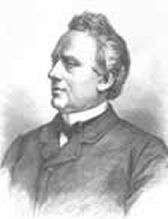Walthère Frère-Orban
| Walthère Frère-Orban | |
|---|---|
 | |
| Prime Minister of Belgium | |
|
In office 19 June 1878 – 16 June 1884 | |
| Monarch | Leopold II |
| Preceded by | Jules Malou |
| Succeeded by | Jules Malou |
|
In office 3 January 1868 – 2 July 1870 | |
| Monarch | Leopold II |
| Preceded by | Charles Rogier |
| Succeeded by | Jules d'Anethan |
| Personal details | |
| Born |
24 April 1812 Liège, France (now Belgium) |
| Died | 2 January 1896 (aged 83) |
| Political party | Liberal Party |
Hubert Joseph Walthère Frère-Orban (24 April 1812 - 2 January 1896) was a Belgian liberal politician and statesman.
Early life
He was born at Liège, received his education at home and in Paris, and began the practice of law in his native town. He identified himself with the Liberal party, and was conspicuous in the controversy with the Catholic clergy.
Career
In 1846, he wrote the program, which was accepted as the charter for a liberal political party. In 1847 he was elected to the Belgian Chamber and appointed Minister of Public Works. and from 1848 to 1852 he held the portfolio of Finance. He founded the national bank of Belgium, reduced postage, abolished the newspaper tax and was a strong advocate of free trade.
His work, La mainmorte et la charité (1854–57), directed against the Conservatives, produced a great effect on the position of parties in Belgium. As a result, in 1857, the Liberals returned to power and Frère-Orban became once more Minister of Finance in the cabinet of Charles Rogier, whom he succeeded to become the 11th Prime Minister in 1868. In 1870 the Catholics regained their supremacy and forced him to retire, but from 1878 to 1884 he was again at the head of the cabinet, most notably breaking off diplomatic relations with the Vatican in 1880 (which were restored in 1884).
Standing as a liberal again in the October 1894 elections, he categorically refused the support of Catholics against progressives and socialists. He was not re-elected, defeated by the socialist Célestin Demblon.
Weakened by illness, he died 2 January 1896. Frère-Orban lies in its birthplace, Liège, in the cemetery of Robermont.
Political philosophy
Frère-Orban's liberalism consisted in the assertion of the authority of the state over the church and the defense of the system of secular public instruction against the clergy. He was at all times opposed to the "undue extension" of suffrage. Among other works he wrote Le question monétaire.
Honours
- Minister of State, by Royal Decree.[1]
- 1881: Grand Cordon in the Order of Leopold.[2]
- Knight Grand Cross in the Order of the Gold Lion of the House of Nassau.
- 1881: Knight grand Cross in the Order of Saint Stephen of Hungary.[3]
References
- ↑ http://www.ars-moriendi.be/FREREORBAN.HTM
- ↑ Handelsblad (Het) 11-06-1881
- ↑ Handelsblad (Het) 07-05-1881
Sources
- Liberal Archive
 This article incorporates text from a publication now in the public domain: Gilman, D. C.; Thurston, H. T.; Colby, F. M., eds. (1905). "article name needed". New International Encyclopedia (1st ed.). New York: Dodd, Mead.
This article incorporates text from a publication now in the public domain: Gilman, D. C.; Thurston, H. T.; Colby, F. M., eds. (1905). "article name needed". New International Encyclopedia (1st ed.). New York: Dodd, Mead.
| Wikimedia Commons has media related to Walthère Frère-Orban. |
| Political offices | ||
|---|---|---|
| Preceded by Charles Rogier |
Prime Minister of Belgium 1868–1870 |
Succeeded by Jules d'Anethan |
| Preceded by Jules Malou |
Prime Minister of Belgium 1878–1884 |
Succeeded by Jules Malou |